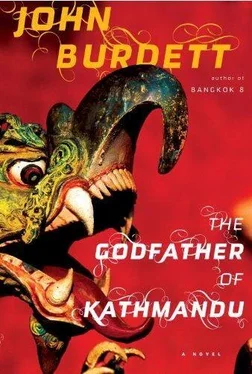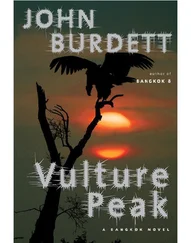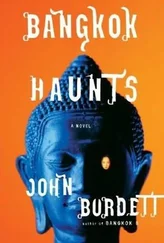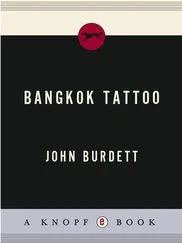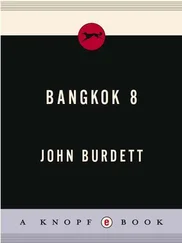John Burdett - The Godfather of Kathmandu
Здесь есть возможность читать онлайн «John Burdett - The Godfather of Kathmandu» весь текст электронной книги совершенно бесплатно (целиком полную версию без сокращений). В некоторых случаях можно слушать аудио, скачать через торрент в формате fb2 и присутствует краткое содержание. Жанр: Полицейский детектив, на английском языке. Описание произведения, (предисловие) а так же отзывы посетителей доступны на портале библиотеки ЛибКат.
- Название:The Godfather of Kathmandu
- Автор:
- Жанр:
- Год:неизвестен
- ISBN:нет данных
- Рейтинг книги:3 / 5. Голосов: 1
-
Избранное:Добавить в избранное
- Отзывы:
-
Ваша оценка:
- 60
- 1
- 2
- 3
- 4
- 5
The Godfather of Kathmandu: краткое содержание, описание и аннотация
Предлагаем к чтению аннотацию, описание, краткое содержание или предисловие (зависит от того, что написал сам автор книги «The Godfather of Kathmandu»). Если вы не нашли необходимую информацию о книге — напишите в комментариях, мы постараемся отыскать её.
The Godfather of Kathmandu — читать онлайн бесплатно полную книгу (весь текст) целиком
Ниже представлен текст книги, разбитый по страницам. Система сохранения места последней прочитанной страницы, позволяет с удобством читать онлайн бесплатно книгу «The Godfather of Kathmandu», без необходимости каждый раз заново искать на чём Вы остановились. Поставьте закладку, и сможете в любой момент перейти на страницу, на которой закончили чтение.
Интервал:
Закладка:
Our high-tech Tibetan gave us GPS coordinates for the precise location of the drop, and both Zinna and Vikorn are following their lieutenants, who are playing with different GPS handhelds and bumping into each other trying to get the coordinates exactly right. It seems we have to walk a little more toward the river, then turn right onto the dock where some huge, black, and rusted cargo ships from China, Korea, and Vietnam are berthed. We are between a couple of container ships, standing under the bows of the Flower of Shanghai and looking the Rose of Danang up and down, when I say, “It’s that one.”
I’m pointing to a ship on the opposite side of the docks which was previously invisible but has come into view as we try to position ourselves in accordance with the Tibetan’s coordinates. I say, “The coordinates he gave are not where he is located. He’s taken us to the point where we can see him, that’s all.”
“See what? I don’t see a damn thing.”
“The prayer flags,” I say, unable to repress a grin. “On that ship over there, all the way up to the top of the mast.”
“Why the hell would he do that?” Zinna moans.
“Because we’re being watched by his people, have been since the minute we arrived,” Vikorn explains in a tone of respect and wonder. “By now he knows everything he needs to know about us. How many men, what kind of weapons, even our morale.”
When we finally arrive at the ship that’s festooned with Tibetan prayer flags gently swaying in the night air, the Tibetan wild man himself is sitting all alone in his open parka on a black iron bollard, his long gray hair tied back. With his eyes rolling, he looks insane.
“Sawatdee krup,” he says in a not-bad accent, showing us the equality wai, with hands raised to eye level and no higher.
“Told you,” Zinna says. “I told you he would come by water.”
Everyone watches while I walk toward Tietsin with the letter of credit in my hand. I hold it in front of his eyes, but he makes no gesture to check it. Instead, he jerks his chin in the direction behind us. We turn to look, but all we can see are the high black bows and shadows in between.
Then they start to appear one by one, all dressed in black. One by one, Zinna, Vikorn, and I drop our jaws in amazement.
“Backpacks?” Vikorn says, gobsmacked, his voice squeaking in disbelief. “He brought in the whole fucking five hundred and thirty-three kilos in backpacks?”
I stare slack-jawed in wonder at Tietsin while his men continue to appear in commando-black T-shirts and pants, with black backpacks. When they have finished arriving there are thirty in all, which I calculate produces an average of about seventeen kilos-thirty-eight pounds-of heroin per backpack. Thirty-eight pounds is the maximum load for paid Sherpas in the Himalayas.
“We thought about other means,” Tietsin says, rolling his eyes back, “but none of them were viable. In the end I had to develop a customs officer mantra with all the ritual that goes with it. So far so good, it seems to have worked fine.” He beams.
“Please tell me you didn’t all take the same plane,” Vikorn says; the blood has drained from his face.
“Of course not. Half of us came on the morning flight, the other half in the afternoon.”
“You, you, you-” I say, then stop. Words fail one at times like this.
“What d’you expect? We’re Himalayans. We don’t know any better. Now, why don’t you tell your little friends to get their chemists working so we can all go home?”
Vikorn and Zinna use their men to seal off the area while the chemists’ van trundles up the docks and the two scientists examine the contents of the backpacks one by one. While they are working, a Tibetan, who was not one of those carrying the dope, comes up to Tietsin and whispers a few words into his ear. The yogin suddenly stares at me in a way that is physically uncomfortable, as if some painful ray has emerged from between his eyes to give me a sudden headache. My bowels turn over and the intolerable nerves of the day return to shake up my whole being. Tietsin doesn’t take his eyes off me while the chemists are taking their samples, so by the time they have finished and are confirming with smiles that they are satisfied it is indeed 99 percent smack in each one of the thirty backpacks, my knees have turned to Jell-O.
And all the time, more and more of his men are emerging from the shadows of the dock. Now it is hard to say how many people Tietsin has brought with him. At first I assumed that some of them, at least, were Thais he’d hired from some underworld connection, but after a few minutes I have changed my mind. You can take the Tibetan out of Tibet, it seems, but you can’t take the vajra out of the Tibetan-there’s something about their eyes that says you don’t exist in the way you think you do-even if they have all shaved and cut their hair. No doubt about it, these are highlander yak rustlers armed with cute little machine pistols who overcame hesitation about five thousand meditations ago. For a mystic, Tietsin has quite a practical side. He jerks his chin at me with demoralizing contempt. Now I am standing in front of him like a naughty schoolboy.
He speaks softly. “Detective, did you ever hear of an asshole named Clive of India?”
“Yes.”
“And do you know what this asshole named Clive of India did to the world?”
“British Empire.”
“Financed by?”
“Opium sales.”
“If you put it like that you risk trivializing his achievement. He was the first to make the connection between arms and narcotics. This little thug from Shropshire, who would certainly have been hanged if he’d stayed in England, saw the way to finance a whole private army, and the model proved so effective they repeated it all over the world: narcotics, slaves, and weapons. It’s the great tripod upon which our global civilization continues to be based, even if they have changed the labels and the slaves get health insurance. The plain fact is, the sociopathic nature of the modern corporation started then and there with Clive. By the time the British narco empire collapsed, twenty million Chinese were addicted to opium and pink-faced syphilitic alcoholics in scarlet jackets were intimidating the whole world with their Maxim guns. The United Kingdom in its modern form is an opium derivative. And what was the point of the exercise? Answer: so middle-class girls in Kent and Sussex could go to school all dressed in white and play the violin instead of going on the Game. If that is good enough justification for enslaving the world and invading Tibet, don’t you think that forty million dollars’ worth of smack is a fair price for freedom and democracy?”
He sighs. “You thought you would play the martyr, get yourself a permanent seat in nirvana in return for your sacrifice, your undeniable stinking goodness? What are you, some kind of Sunday Christian? Didn’t I already make it clear that good isn’t good enough? You accepted the mantra, kid, and you can’t say nobody warned you. Good is even harder to kick than evil. They are a duality, you know that, you don’t get one without the other. I dread to think what kind of sanctimonious asshole you would have turned into, probably about five minutes before Vikorn snuffed you, if we didn’t get to you first.” He lets a couple of beats pass while he examines my shocked and terrified mug. “It just ain’t that easy, you of all people should know that. And anyway, you have no right to deprive me of my karma. It’s all me driving this. This is my moment, not yours, so who the fuck are you to screw it all up just because you can’t live with yourself? If you can’t live with yourself, dump your self.”
“The Buddha came to me in a dream,” I mumble. “He showed me the gas bottles.”
Читать дальшеИнтервал:
Закладка:
Похожие книги на «The Godfather of Kathmandu»
Представляем Вашему вниманию похожие книги на «The Godfather of Kathmandu» списком для выбора. Мы отобрали схожую по названию и смыслу литературу в надежде предоставить читателям больше вариантов отыскать новые, интересные, ещё непрочитанные произведения.
Обсуждение, отзывы о книге «The Godfather of Kathmandu» и просто собственные мнения читателей. Оставьте ваши комментарии, напишите, что Вы думаете о произведении, его смысле или главных героях. Укажите что конкретно понравилось, а что нет, и почему Вы так считаете.
